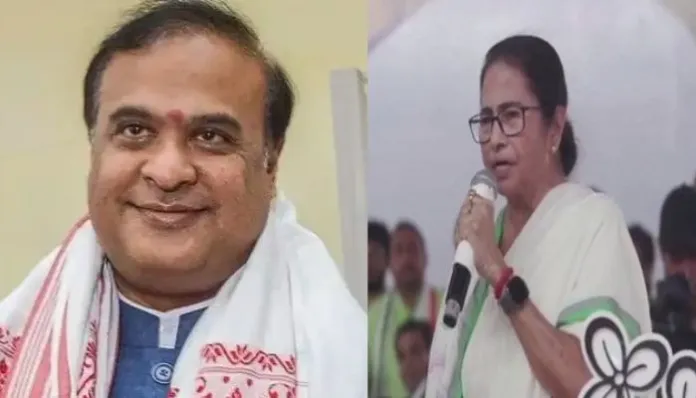Assam’s Chief Minister, Himanta Biswa Sarma, has sharply criticized West Bengal Chief Minister Mamata Banerjee for her divisive ‘burn’ statement in a heated war of words that has garnered national attention. A major political controversy surrounding Sarma’s retort, “How dare you threaten Assam?” has repercussions for the tenuous inter-state relations between West Bengal and Assam.
Mamata Banerjee’s Controversial ‘Burn’ Remark
The controversy began when Mamata Banerjee, while addressing a public rally, allegedly made a comment suggesting that Assam could face consequences that might ‘burn’ the state if certain policies were pursued. The remark was perceived by many as a direct threat to Assam, igniting a wave of criticism from Assam’s political leadership and public alike.
Banerjee’s statement was seen in the context of the ongoing political tussles between the two states, particularly over issues like border disputes, NRC (National Register of Citizens), and CAA (Citizenship Amendment Act). Her remark has been interpreted as an attempt to influence the political landscape of Assam, which shares a sensitive border with West Bengal.
Himanta Biswa Sarma’s Strong Response
Reacting sharply to Banerjee’s statement, Himanta Biswa Sarma did not hold back. In a press conference held in Guwahati, Sarma fiercely criticized the West Bengal Chief Minister. “How dare you threaten Assam? Assam is not afraid of anyone. We know how to protect our land and our people”, he said, underscoring Assam’s readiness to defend its sovereignty.
Sarma’s response is reflective of his no-nonsense political style and his commitment to safeguarding Assam’s interests. His comments have been widely supported by Assamese leaders across the political spectrum, who view Banerjee’s remarks as an unwarranted interference in Assam’s affairs.
Political Repercussions and Public Reaction
The political climate in both states has changed considerably as a result of the swap. Sarma’s unwavering position has enhanced his reputation as a formidable leader in Assam, one who isn’t hesitant to challenge powerful individuals such as Mamata Banerjee. However, Banerjee’s words have come under fire from both her political rivals and some members of her own party, who feel that they were superfluous and could worsen ties between states.
Public reaction in Assam has largely been supportive of Himanta Biswa Sarma. Many Assamese people have taken to social media to express their anger over Mamata Banerjee’s statement and have praised Sarma for his prompt and assertive response. The sentiment on the ground suggests a rising wave of regional pride and support for Sarma’s leadership in protecting Assam’s interests.
Implications for Inter-State Relations
The war of words between Himanta Biswa Sarma and Mamata Banerjee could have broader implications for inter-state relations in India. Both Assam and West Bengal are crucial states in the eastern part of the country, with significant political, economic, and cultural ties. Any escalation in tensions could potentially disrupt these ties, affecting not only the two states but also the broader regional dynamics in the northeastern part of India.
Experts suggest that such public spats could be detrimental in the long run, potentially affecting cooperation on key issues such as border security, economic development, and cultural exchanges. Political analysts are calling for restraint and constructive dialogue to address any grievances and prevent further deterioration of relations.
The sharp exchange between Himanta Biswa Sarma and Mamata Banerjee over the ‘burn’ remark highlights the complex and often contentious nature of inter-state politics in India. While Sarma’s response has been hailed as a defense of Assam’s pride and sovereignty, Banerjee’s remarks have been widely criticized as provocative and unhelpful. As the political drama unfolds, it remains to be seen how both leaders will navigate the delicate path of maintaining political support while ensuring peaceful and constructive inter-state relations.


